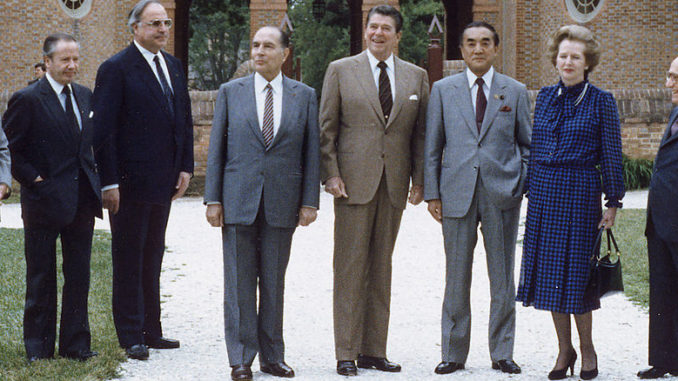
Too often terms are bandied about as if everyone is intimately familiar with them. Exposed only to the term, people develop a passing familiarity with them without ever being provided necessary information.
The G-7 is an example of this. For many, it is merely “an economic event” that draws anarchists to riot in the streets. With ignorance abounding, it becomes easy target as something organized by “the globalists”.
(“Globalist” is an interesting term in itself. To the political left, it’s multinational corporations stealing the wealth of the average person. To the New Right (the political left in nationalist clothing) it’s an attempt at One World Government and New World Orderism.)
But what is it?
The G-7 is a group of powerful nations – all democracies or representative republics – who, acknowledging their combined global footprint, attempt to negotiate development agreements to prevent any massive social, political and fiscal upheavals. If the United Nations were likened to a giant city council meeting, the G-7 would be the seven most prominent city leaders getting together with their families for a weekly barbecue.
It started in 1973 when a group of finance ministers got together in the White House. France, the U.K. and West Germany’s representatives came and discussed world fiscal matters such as how to deal with currency manipulation and resource management (in the early 1970s, the dominant economic theory was that the world was running out of resources. Even though the theories have subsequently been conclusively disproven, they were a great concern of the time.)
The meeting was successful, and the ministers decided to schedule another. They quickly decided to make it a regular event, and invited Japan to join. This became the Group of Five.
The continued success of this event helped to inspire the national leaders to emulate it. In 1975, the G-6, or Group of Six, was formed by the leaders of the Group of Five nations with Italy’s Prime Minister included. The next year, Canada’s Prime Minister was included and the contemporary G-7 was born.
Very little in the way of concrete policy gets hammered out at the G-7 meetings, but information about trends is shared, concerns about possible economic problems are shared, solutions are brainstormed, and new policy innovations are developed. Specific details are arranged later, whether in the form of national reforms or international arrangements.
The G-7 is, effectively, exactly what the United Nations was designed to be… but far more successful than the United Nations because it is not bogged down by layers of bureaucracy, false equivalencies and vote blocs. It is a forum in which friendly nations can propose solutions to global issues, while avoiding any illusion of an outside authority. The G-7 nations are not answering to any groups other than their own citizenry; they’re simply talking among themselves.
To anyone fearing the rise of a globalist agenda, they should reasonably be a Godsend. Their regular discussions help to correct problems before they can be leveraged into disasters. The G-7 stands, in its casual setting, as a greater impediment to George Soros or The Network becoming potential world dominators than a legion of James Bonds would be.
It has fostered not only successful policy initiatives but heightened affinity between world leaders. It has been so successful that Russia, upon becoming a democracy, was eager to get involved. In 1994, shortly after the fall of the Soviet Union, the Russian leader began attending the summits and the G-7 became the G-7+1. In 1997, they became the G-8. The close affiliation was likely a key reason why George W. Bush, early in his Presidency, viewed Putin as a potential strong ally.
In 2014, after Russia annexed Crimea – the latest and most grievous of a series of dictatorial offenses- they were ejected from the G-8. To further the original analogy, when your barbecue buddies discover that you’re the one who’s been slashing tires and poisoning their pets, you’re not likely to be invited for burgers next week.
This is what President Trump walks into today. Most of the other leaders, viewing themselves as having been attacked by Trump, are currently feeling solidly negative toward him and there are active discussions about whether the G-7 will reform as a G-6, without the United States. It is reasonable to hope that all sides recognize the good this forum has done in the past, and take steps to preserve it.
